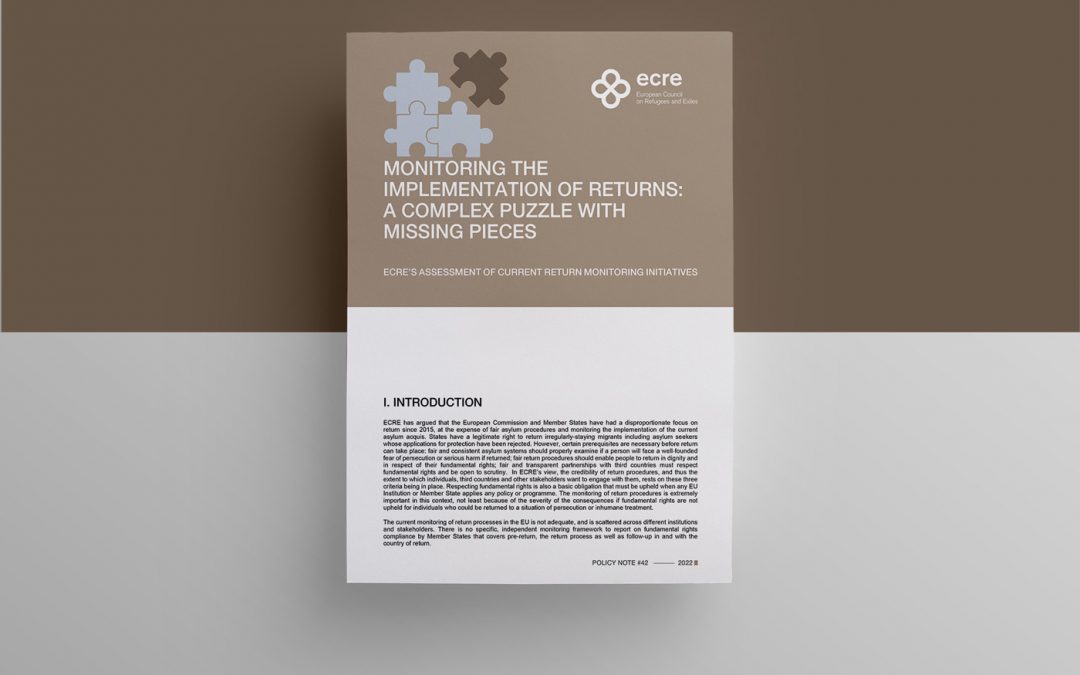ECRE has published a Policy Note that assesses current return monitoring initiatives. It finds that the current monitoring of return processes in the EU is not adequate, and is scattered across different institutions and stakeholders. There is no specific, independent monitoring framework to report on fundamental rights compliance by Member States that covers pre-return, the return process as well as follow-up in and with the country of return.
In ECRE’s view, the credibility of return procedures, and thus the extent to which individuals, third countries and other stakeholders want to engage with them, rests on three criteria being in place: fair and consistent asylum systems should properly examine if a person will face a well-founded fear of persecution or serious harm if returned; fair return procedures should enable people to return in dignity and in respect of their fundamental rights; fair and transparent partnerships with third countries must respect fundamental rights and be open to scrutiny. The monitoring of return procedures is extremely important in this context, not least because of the severity of the consequences if fundamental rights are not upheld for individuals who could be returned to a situation of persecution or inhumane treatment.
This Policy Note analyses the following return monitoring initiatives:
- Quantitative monitoring or the stats: Although ECRE has criticised the overreliance on evaluating returns solely on the numbers (the return rate), quantitative data is an important element in evaluating what is happening on the ground;
- Impact and other assessments of the 2018 Return Directive: Since 2014, there has been no formal evaluation of the application of the Directive by the European Commission;
- Schengen Borders Code monitoring: while the new system has improved from a fundamental rights point of view, it is essentially peer-review; as Member States are assessed once every seven-year cycle, it does not constitute ongoing, detailed monitoring;
- Reporting by the European Migration Network (EMN): The annual report provides important information often lacking elsewhere, but is self-reporting. The EMN Return Expert Group (EMN-REG) has also been appointed to monitor the implementation of internal EU elements of the EU strategy on voluntary return and reintegration;
- Reporting by the European Border and Coast Guard Agency (Frontex). Frontex’s role in forced returns and voluntary departure has grown enormously; this has not been met with increased monitoring and strengthened accountability;
- Forced return monitoring: Under Article 8(6) of the Return Directive, Member States are obliged to establish a system for monitoring forced return, although not on every flight, and reports are not often public; the Fundamental Rights Agency (FRA) publishes an annual update of different forced return monitoring systems, including indicators for an effective forced return monitoring system;
- Monitoring return in third countries: Currently there is little standardised or public monitoring of returnees’ situation post-return, save for reports from implementing partners on reintegration support or ad hoc research;
- Monitoring relations with third countries on return: The main monitoring of relations with third countries on return is through the Visa Code Regulation to ensure that third countries are cooperating on returns. This in itself is telling;
- The Return Coordinator: The Return Coordinator was appointed in March 2022. As it is a new role, it remains to be seen how the coordinator engages with the different efforts to monitor return.
The Policy Note concludes with recommendations to Member States and the European Commission with suggestions related to the Return Coordinators and the European Parliament’s role in return monitoring.
For further information:
- ECRE, Policy Note: Return Policy: Desperately Seeking Evidence and Balance, July 2019

